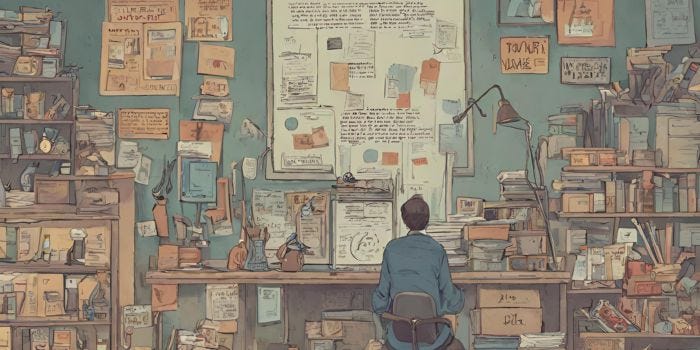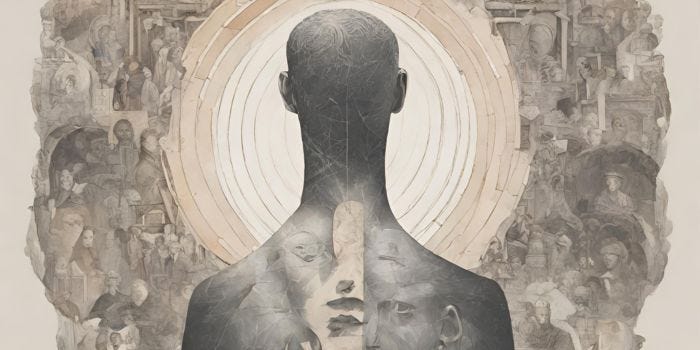Redefining Identity: You Are More Than Your Job
Written on
Chapter 1: The Impact of Work on Identity
It's time to reconsider how we perceive work, relationships, and accomplishments.

Let me emphasize this clearly: YOU ARE NOT YOUR JOB.
Allow me to share Jacob's story. Jacob was an exceptionally diligent individual who dedicated countless hours to his work over the years. He found joy in his long hours, and whenever he met someone new, he would always begin by discussing his profession.
Jacob excelled in his role. He was known for his professionalism, meticulous attention to detail, and his ability to maintain customer satisfaction and loyalty. His job was his sole source of pride and the primary means by which he socialized, as he lacked a robust social life. He derived his happiness from his professional achievements, essentially identifying himself with his work.
He was a fulfilled individual, eager to contribute to his organization, which regularly lauded him for his dedication and performance. However, everything changed abruptly after 35 years when new management decided to restructure the company, leading to Jacob's layoff.
In an instant, he found himself unemployed. All his accomplishments and the happiness tied to them disappeared. Jacob plunged into an identity crisis, grappling with a loss of self. He couldn't fathom how this could happen to him; he had poured his heart and soul into the company, earning respect from superiors and peers alike.
Suddenly, the foundation of his identity crumbled, leaving him devastated and isolated. Unable to find purpose, he turned to drinking as a coping mechanism.
Jacob’s experience, while extreme, is representative of a broader issue.
Chapter 2: The Burden of False Identity
When we meet someone, one of the first questions we pose is, “What do you do?” We often tie our identities to external factors like our jobs. But why do we allow this?
Why do we accept the notion that our identities should be defined by things beyond our control? How can we take pride in such aspects, knowing they could be taken from us at any moment? This mindset sets us up for an identity crisis.
Examples abound: “I’m a proud engineer at XYZ Company; they’re like family to me.” “I’m a happily married man to ZYW.” “I’m a proud homeowner with three properties.”
While it's perfectly acceptable to take pride in our jobs, relationships, and achievements, it’s crucial not to let these define who we are. It’s wonderful to have these facets of life, but we are not merely reflections of them.
I realize this perspective contradicts much of what society teaches us. We're encouraged to allow these aspects to define us. However, this is problematic because any of these elements can vanish unexpectedly.
You might find yourself separated from your partner. You could lose your homes due to unforeseen circumstances. And as Jacob learned, you could lose your job after decades of service.
Linking your identity to factors beyond your control only invites unnecessary suffering into your life. In a world that glorifies careers, relationships, and achievements, challenging this norm by not allowing these to dictate your identity is revolutionary.
You are not your profession. You are not your relationships. You are not your accomplishments. You are not simply how others perceive you.
So, what are you? That’s a continuous journey of self-discovery—the true essence of life. It involves trying new experiences and evolving your identity along the way. Life is a series of trials and errors; why should our identity be any different?

Chapter 3: Discovering Your Authentic Self
To start redefining your identity, grab a notebook and write down what you believe defines you. If your list includes external factors like your job, accomplishments, or how others view you, cross them out. Instead, focus on what is within your control:
- I love helping others.
- I’m an avid reader.
- I express my thoughts openly.
- I take joy in making my loved ones happy.
- I continuously challenge myself.
- I’m a Star Wars enthusiast.
You might think these traits could change, too. That’s acceptable; identity is not static but fluid. The key difference is that any changes in these aspects depend solely on you, unlike your job security.
While you cannot completely eliminate suffering from life, you can certainly minimize it. Keeping your identity rooted in what you can control is an effective strategy for achieving this.
Now, I invite you to share in the comments: How short is the list you created?
The first video, "You Are Not Your Job - Self-help Singh," delves into the importance of separating our identities from our professions and offers insights on maintaining a healthy self-image.
The second video, "You Are Not Your Job. You Are You," emphasizes the journey of self-discovery beyond career labels and societal expectations.